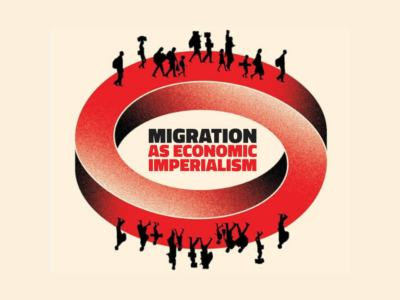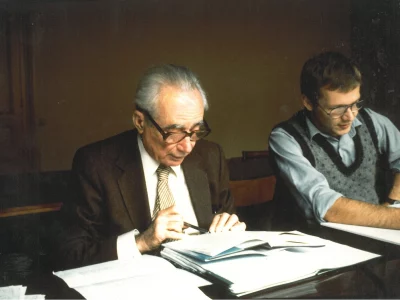Introduction
In July 2025, Monthly Review Press is republishing Arghiri Emmanuel’s book Unequal Exchange: A Study of the Imperialism of Trade as an updated edition with a new introduction and preface.
Emmanuel wrote his pathbreaking book in the late 1960s in Paris, after being deported from Congo, by Belgian settlers, because of his cooperation with Patrice Lumumba, during the crisis in 1960.[1]
Unequal Exchange was published in French by Maspero in 1969 and in English by Monthly Review Press in 1972. It generated an intensive debate about the political economy of imperialism. The republication of the book is a sign of renewed interest in the theories of Emmanuel, who passed away in 2001, and in the political economy of imperialism in general.
The essence of unequal exchange can be explained short and simple, in the Marxist conception of value, by the dual expression of exchange value, as measured either by the price of the commodity or by the labor-time it takes to produce it.
The exchange value of an iPhone for example, can be expressed in the price and in the labor-time it takes to produce it. Say, 1,000 dollars and 50 hours. There is a tendency of globalization of the prices of commodities, but not on the price of labor-time—the wage. The price of an iPhone may vary slightly from country to country, but not on scale like wages. The monthly average wage in manufacturing in the United States is around 6,000 dollars, in China 1,100 dollars, in Vietnam or Mexico 600 dollars, and in India around 200 dollars.[2] So, when commodities are exchange between the United States and the global South at market prices, there is an unequal exchange of value in terms of labor-time.
Fundamental Changes
At the time Emmanuel wrote his book, the world market and the international division of labor was very different from today. Neoliberal globalization has in the past fifty years changed the world profoundly. From capitalism’s very beginning up to the 1970s, the countries of the periphery mainly served as sources of raw materials and tropical agricultural products. In the 1950s, industrial goods made up only 15 percent of the exports from the third world countries. By 2009, the number had risen to 70 percent.[3]
In 1980, the numbers of industrial workers in the Global South and Global North were about equal. In 2010, there were 541 million industrial workers in the Global South, while only 145 million remained in the Global North.[4] The center of gravity for global industrial production no longer lies in the Global North, but in the Global South.
The process of neoliberal globalization unleashed a quantitative and qualitative expansion of the productive forces—computers, cell phones, Internet, new management systems, and logistics. The result was the globalization of capitalist production itself in the form of global production chains. Consequently, global trade triple from 1970 to 2000 from 10 percent to 30 percent of the total global domestic production.[5] The transfer of value by unequal exchange grew to new hights. A recent study by Jason Hickel, Morena Hanbury Lemos, and Felix Barbour has quantified the size of unequal exchange:
We find that, in 2021, the economies of the global North net-appropriated 826 billion hours of embodied labour from the global South, across all skill levels and sectors. The wage value of this net-appropriated labour was equivalent to €16.9 trillion in Northern prices, accounting for skill level. This appropriation roughly doubles the labour that is available for Northern consumption but drains the South of productive capacity that could be used instead for local human needs and development. Unequal exchange is understood to be driven in part by systematic wage inequalities. We find Southern wages are 87–95% lower than Northern wages for work of equal skill. While Southern workers contribute 90% of the labour that powers the world economy, they receive only 21% of global income.[6]
The size of these ciphers is adequate to explain the division in the world between rich and poor countries.
Neoliberal globalization gave capitalism forty golden years with high profits for capital and cheap products for consumers in the global North. However, given monopoly capital’s desire to maximize profit by outsourcing industrial production to low-wage countries, the Global South was industrialized, transferring technology and knowledge, which now has changed the economic balance in the world-system.
In the late 1970s, when my comrades and I were studying Unequal Exchange, we wondered why capital did not move industrial production to the Global South to take advantage of low wages. We discussed this with Emmanuel, who cited several practical, technical, cultural, and political reasons. Transport and communications posed much bigger obstacles to control the production process at distance, than they do today. The trade unions in the Global North, in the 1970s, still had the strength to resist outsourcing. The social democratic-led states had the ambition to control the multinational companies, through regulation of investment and trade. All this, however, changed with the expansion of neoliberalism.
Capitalism, as a dynamic system, had an ace to play. Its need to expand and its hunger for profit led it to outsourcing industrial production to the Global South. Geographic distance did not seem to matter anymore. Emmanuel somehow anticipated this development in 1976:
Another specific feature of the multinational company (MNC) which is vaguely considered to generate prejudice but which, if it really exists, is eminently advantageous, is its independence of the domestic market of the receiving country. Since the main problem of capitalism is not to produce but to sell, less traditional capital was attracted by the low wage rates of certain countries than was discouraged by the narrowness of the local market associated with such wages. This lack of capital in turn prevented growth and hence wage increases. The result was deadlock. In theory the solution was production for exports alone. But except for standardized primary products, such an operation appeared to transcend the fief of the traditional capitalist. In any case, it has never occurred.
The MNC, with its own sales network abroad and, even more, its own consumption in the case of a conglomerate, would not be put off by the lack of “pre-existing” local outlets. It would take advantage of both the low wages of the periphery and the high wages of the centre. I have no idea of the relative importance of the phenomenon. Here, as elsewhere, statistical information is lacking. Albert Michalet considers that it is very extensive in quantity and very important from the point of view of quality. All I can say is that, if this is so, this gives us for the first time the possibility of breaking the most pernicious, vicious circle which was holding up the development of the Third World. It is rather a matter for rejoicing.[7]
This was exactly what happened. Emmanuel was aware of the role that the transnational companies had in the third world in terms of value transfer, by unequal exchange, towards the center, but also in regard to developing the productive forces and technology transfer in the periphery. We must differentiate between development within the capitalist mode of production and the change of mode of production. Emmanuel did not like multinational companies, but he shared Marx’s dialectical approach concerning the development of capitalism, the need to develop the productive forces, because it prepared the way to a more fully developed modernity—the next step—socialism.
Multinational capital established production in China for export to the consumer markets in the Global North; however, at the same time, it developed the productive forces in China to the extent that China could break the century-old polarizing dynamic in world capitalism between an overdeveloped North and underdeveloped South.
Capitalism solved its economic and political crises in the “long sixties” through the neoliberal counteroffensive against “the social state” in the Global North and anti-imperialist forces in the Global South. It even managed to dissolve, the transitional states in the Soviet Union and East Europe. Deregulation of global capital movements and trade paved the way for a new international division of labor. China became the largest producer of industrial commodities in the world. Not only were investment and trade globalized, but production itself also became transnational in the form of production chains stretching from Global North to the South and back again.
In the 1970s, dependency theorists thought that it would be impossible for the third world to industrialize within the imperialist system. They believed that third world countries would continue to supply raw materials, tropical agricultural products, and simple labor-intensive industrial commodities. Their economies would remain dependent, and they would continue to constitute the periphery of the capitalist world-system. The only way out of this situation was a socialist revolution and de-linking, as recommended by Samir Amin.
Dependency theory did not foresee the massive industrialization of the periphery in the past forty years, because it assumed that a domestic market had to be developed before industrialization could become possible. It underestimated the development and the power of the capitalist productive forces that led to the globalization of the production process itself. New commutation and logistic technology in combination with the liberalization of capital movement and trade made industrialization of the Global South possible, based on the Global North as the consumption market. The low-wage labor in the South provided the surplus labor, and the consumption power in the Global North realized the profit.
Few at the time imagined the collapse of the Soviet Union and the integration of China into the world market. It seemed unthinkable that only a few decades later 80 percent of the world’s industrial proletariat would live and work in the Global South and that the Global North would be rapidly deindustrialized.
The export-oriented industrialization of the Global South, and the creation of global chains of production, increased the transfer of value from low-wage workers in the South to corporations and consumers in the North, hidden in the distortion of the prices on a massive scale.
But the question of unequal exchange was not the only issue at stake in the outsourcing of industrial production to the Global South. The discussion of advanced capitalism’s role in the development of the productive forces in the periphery was raised by Emmanuel in 1982, in his book Appropriate or Underdeveloped Technology? The value-transfer had in the past entailed a dynamic development of the productive forces in the center but blocked the development in the periphery. Neoliberal globalization changed that. As an unintended side effect of the exploitation of the proletariat of the Global South, it developed the productive forces. Emmanuel claimed that multinational companies’ investments and the implicit transfer of appropriate technology were better than the use of the underdeveloped technology at the disposal of third world countries. Emmanuel stated that we should not:
…slide from the criticism of capitalism in general to the denial of development within capitalism. In other words, this trend forgets that if capitalism is hell there exist a still more frightful hell: that is less develop capitalism. This is because, if capitalism has not got a historical “mission”, is nonetheless has a place in human history; it is not a bad dream. By its very nature, it develops the productive forces, and if this development does not ipso facto lead to the satisfactions of “social needs it nonetheless constitutes…a much more favourable framework for a certain satisfaction of these needs than those of the past class regimes.[8]
This was a provocative stand, as multinational capital was the face of the enemy—capitalism. However, Emmanuel’s point of view was not new, but in tune with the progressive role of capitalism in developing the productive forces, mentioned in the Communist Manifesto. In a dialectic way, Karl Marx on one hand affirmed the positive, progressive features of capitalism, such as new technology, development of science, industrialization, and so on. On the other hand, he denounced exploitation, the commodification of social relations, imperialism, and its connected mass extermination, all inherent in the capitalist modernization process.
The encounter with neoliberalism was different from place to place. In the Soviet Union and East Europe, neoliberal “shock therapy” broke down the national project of “real existing socialism.” In Africa and Latin America, where multinational capital was in command of the process, “structural adjustment” led to brutal exploitation and national economies being in deep debt crises. Neoliberalism also penetrated deep into the Chinese economy in the 1990s. However, the Chinese Communist party was able to keep its national project intact.
The raise of China as an economic world power in recent decades proved Emmanuel right. In a world-system, where capitalism was still the main driver of the development of productive forces, a poor country, trying to develop socialism, cannot—and should not—avoid the interaction with the most advanced part of capitalism, because their investment entails the transfer of advanced technology. However, it is a complicated and dangerous game, in which the successful outcome is dependent on the poor state’s ability to uphold and defend a national project for the benefit of the working class. Hence, the difference in the encounter with neoliberalism in China and most of the Global South.
But most important, the rise of China as the world’s leading industrial power has broken the polarizing dynamic of imperialism for the first time in two hundred years. By the rise of China, and the development of a multipolar world-system, the world is undergoing a profound change not seen in the past hundred years.
The development of the productive forces in the Global South has placed them in a much better position to achieve this goal than in the sixties.
The United States is still the dominant aspect in the principal contradiction, but the South is on the offensive, encircling the center. While the transformative power of the third world in the 1970s was based on the “revolutionary spirit”—the attempted ideological dominance over the economic development—the current transformative power of the Global South is based on its economic strength.
The combination of the decline of U.S. hegemony and the rise of China and a multipolar world-system signifies that the value transfer from the Global South to the North will decline. The consequence is, that the mechanism, which gave capitalism in the West a dynamic development, by solving the contradiction between the production and the realization of goods by the sale on the market, to secure the profit, is becoming dysfunctional.
The end of imperialism means the end of capitalism as a dynamic mode of production, and it opens up the development of a socialist mode of production. The transitional mode can delink from the remaining shackles from the capitalism on the international and national level, as they can no longer generate progress and only create problems. The delinking is now more in terms of mode of production than in geographical terms.
Ecology
The over- and underdevelopment dichotomy also has an ecological meaning, and this aspect it means that we are working under time pressure, due to capitalism’s impact on climate change. Ecological sustainability was not a major focal point in many theories of imperialism in the 1970s. Emmanuel, however, was aware of it. The periphery was not just underdeveloped; the center was overdeveloped. In 1975, he wrote:
6% of the world’s population already consumes over 40% of the world’s raw materials. Present world production in physical terms could only feed, clothe, house, etc., about 600 million people on the American level.
Americans consume nearly 700 kilos of steel per head per year. If the whole world started to consume as much, all known reserves of iron ore would be completely exhausted in 40 years, —provided the world’s population ceased to increase, otherwise depletion would come even sooner.
The same equalisation of world consumption from above, still with a stable population, would exhaust the known reserves of copper in 8 years, tin in 6 years, etc….
Ecological Constraints
But exhaustion of present and future resources is not the only factor preventing world equalisation from above. Ecological limits constitute another factor.
If the present developed countries can still get rid of their waste products by dumping them in the sea or expelling them into the air, it is because they are the only ones doing it.
Just as their inhabitants can still travel by air and fly the world’s skies only because the rest of the world does not have the means to fly and leaves the world’s air routes to them alone. And so on….
This also means, in a sense, that the countries on the periphery are henceforth not the weakest link in the chain but the only true revolutionary area. Their local conservative forces are allied, not with certain classes in other countries, but with certain nations belonging to the same class. At any rate, the physical terms of the problem as set out above show clearly that its solution has as its framework and parameters mankind as a whole. Any class contradictions that may remain in the developed countries become secondary. The main contradiction—the motive force of change—is henceforth to be found in international economic relations.[9]
To move forward, to an advanced socialist mode of production, it is necessary to build socialism on the national level and to develop the universal and global dimension of socialism. An advanced socialist mode of production must be realized on the global level, as it has to solve the historically inherited problem of inequality between center and periphery in the world-system, as well as the global ecological and climate problems.
Emmanuel did not believe it was possible for an equalization to take place within the capitalist mode of production:
Under no circumstances can all of the “Indias” become the United States, assuming that they want to. The United States is only the United States because the others are not. The level of development they have arranged considerably exceeds the global margins of the capitalist system worldwide: they are, in capitalist terms, overdeveloped. Naturally, they can only be overdeveloped because there are sufficient exploitable underdeveloped areas around them. It may still be possible to achieve this accelerated “extroverted” development in a particular small country, if the little international capital available is concentrated there. This will be because the others will not follow suit. For the whole of the Third World, such an attempt would be, apart from any value judgment, materially futile. The only way left to it is to set fire to the capitalist stage.[10]
So What Would Emmanuel Have to Say Today?
Looking at the world today, I think Emmanuel would claim, that his theory of unequal exchange is more relevant than ever to understand the flow of value from low-wage countries to the imperialist center.
He would be amazed by the industrialization of the Global South, not anticipated by dependency theory. He would consider it a positive development, as developed capitalism is better that underdeveloped capitalism, and the transfer of productive forces and advanced technology to the periphery is a precondition for a successful delinking from imperialism and a transition towards a socialist mode of production.
He would be seriously concerned about the ecological problems created by the ecological unequal exchange and “the imperial mode of living” risking a climate collapse.
He would argue that the erosion and fragmentations of the world market would generate a deep economic crisis.
He would applaud the decline of U.S. hegemony, as it opens up the possibilities for a radical change of the world order.
In all, I think Emmanuel would say: that the system is becoming ripe for revolution—and “The only way left to it is to set fire to the capitalist stage.”
July 2025
- Emmanuel’s Association with Patrice Lumumba and His Expulsion from Congo – Arghiri Emmanuel Association. ↑
- Gross Average Monthly Wages by Indicator, Country and Year. UNECE Statistical Database. ↑
- UNCTAD (2009), Handbook of Statistics, 1980–2009. New York & Geneva: United Nations. ↑
- Intan Suwandi and John Bellamy Foster, “Multinational Corporations and the Globalization of Monopoly Capital,” Monthly Review vol. 68, no. 3 (July–August 2016), p. 124. ↑
- Gastón Nievas and Thomas Piketty, Unequal Exchange and North-South Relations: Evidence from Global Trade Flows and the World Balance of Payments 1800-2025 (2025), file:///C:/Users/torki/OneDrive/Skrivebord/WorldInequalityLab_WP2025_11_Unequal-Exchange-and-North-South-Relations_Evidence-from-Global-Trade-Flows-and-the-World-Balance-of-Payments. ↑
- Jason Hickel, Morena Hanbury Lemos, and Felix Barbour, “Unequal Exchange of Labour in the World Economy,” Nature Communications 15 (July 2024): 6298. ↑
- Arghiri Emmanuel, “The Multinational Corporations and Inequality of Development,” International Social Science Journal, vol. 28, no. 4 (1976), pp. 766-67. ↑
- Arghiri Emmanuel, Appropriate or underdeveloped Technology? (New York: John Wiley & Sons, 1982), 105. ↑
- Arghiri Emmanuel Unequal Exchange Revisited. IDS Discussion Paper, no. 77 (Brighton, U.K.: University of Sussex, 1975), 65-67. ↑
-
Arghiri Emmanuel, “The Multinational Corporations and Inequality of Development International,” Social Science Journal, vol. 28 no. 4 (1976), 753-772; UNESCO. Paris 1976. The Multinational corporations and inequality of development—UNESCO Digital Library. ↑




